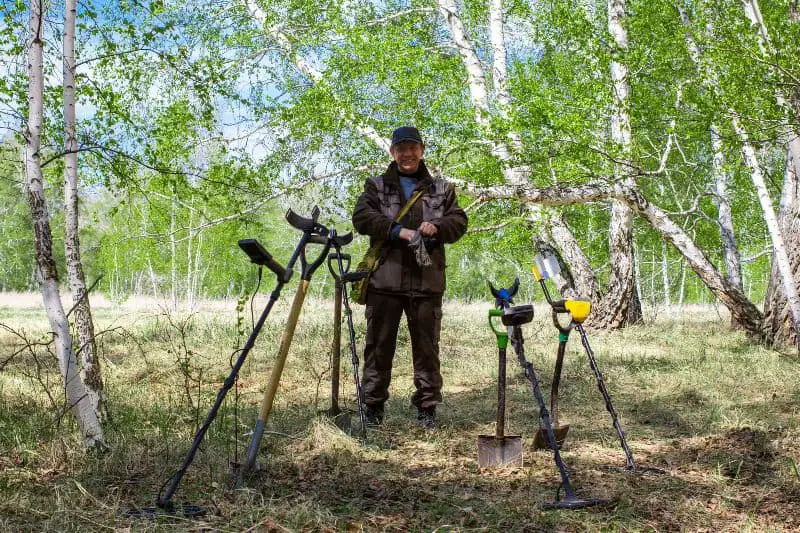
Metal detecting is often considered as a hobby, that’s why it is mostly about having fun and living a good time. However, there are some hobbyists who really want to take it to the next level and want to claim expertise when it comes to this activity …
Obviously, that’s not an easy task and it requires a ton of hard work, not to mention that you need to know what you are doing!
This article will give you a sort of blueprint from A to Z on how to actually become a metal detecting expert!
Choose the right metal detector for your hunt
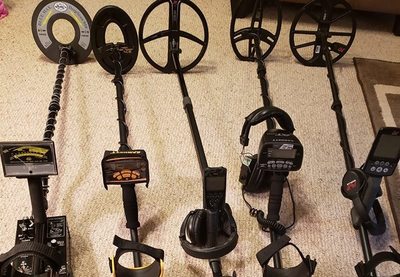
First thing you need to learn to become master is to learn what metal detector to choose! Below are the main factors that you need to consider:
- Your current budget
- Current Level of expertise
- What are you looking for
It is always better to buy a machine from a well-known brand that is recognized for its reliability. Examples of good medal detector brands include:
- Minelab
- Garrett Electronics
- Nokta Detectors
What you are looking for in terms of targets is also a deciding factor. Indeed, there are machines are great for finding gold (these are called gold detectors),then there are others that do very well finding coins …
There are also some machines that perform extremely well when it comes to finding relics.
Quick Recommendation: If you are a beginner, then it would definitely be a great idea to consider multi-purpose machines that can find all sorts of targets. For example, this All-purpose Metal detector can find all metallic objects including Gold.
To learn more about that, you can check this metal detector selection guide.
Prepare your metal detecting spots hitlist in advance …

Location is of prime importance if you want to find treasure with your metal detector. Making a hitlist of places you can target is an excellent idea as it will ultimately determine what you will find and how much treasure you will end up finding …
For example, if you detect at the beach, you are more likely to find lost jewelry, watches, and coins. Similarly, if you visit the site of a Civil War battlefield, you are likely to find shell casings, bayonets, flat buttons, and canteens. So similarly, the location where you search has an impact on what treasures you find.
Most veteran detectorists tend to have a rule of thumb, which is to search where many people have assembled or passed through. These include sites like:
- Beaches
- Parks
- Playgrounds
- Schoolyards
- Ballfields
- Biking or hiking trails
- Picnic areas
- Recreation areas
- Outdoor theaters
Even before going out with your detector, the first step you should be doing is to research the history of your town…
Finding treasure involves upfront planning and research. Find out the background of your city or town. Here are some of the excellent detecting locations you should research before heading out with your detector:
- Boarding houses
- Hotels
- Salons
- Abandoned houses
- Sites of crime stories or unsolved robberies
- Civil War battlefields and encampments
- Discovery of ores of gold, silver, or copper
- Halls and meeting places for groups
- Local landmarks and points of interest
- Wagon train and emigrant routes
- Surveying expeditions
- Social and church events
- Location of the old town dump
- New bridges or thoroughfares that have opened up
- Fore, floods, or disasters that destroyed some buildings
Want to know about more locations? Check those 50 Locations!
Research those metal detecting spots and make a short list
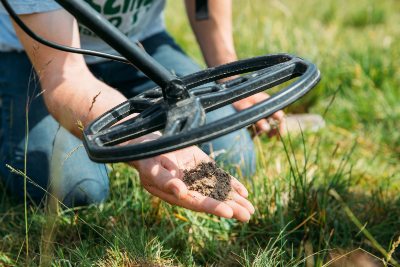
Research is very important! No point in randomly visiting a location without researching it first …
Research means using various tools to zoom onto a specific location. You can conduct interviews with locals, especially the older adults who have been staying for a long time in the same town.
You can visit your local library and go through the archives. Look for old maps and photos that can provide additional information.
Research old maps of your town and learn about the old hidden spots in your town. These spots are known to yield some great finds.
Remember that the best place to detect old coins is where people have lived for a long time. Of course, you should also utilize the internet and Google Maps to zero in on potential sites.
After gathering sufficient data, check which places or landmarks in your area have existed for a long time. If you want to search for some ancient coins, you need to find a place that has been in existence around that particular time period.
For example, if you want to find coins from the 1800s, you need to find a place that has existed since the 1800s as well. Remember that sometimes new landmarks or buildings get built on old land, and digging there could also provide some good finds.
Be equipped with the necessary tools
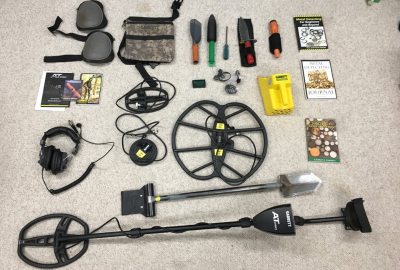
Having the right tools can make the difference between a successful and an unsuccessful hunt. Apart from having the right metal detector, you also need suitable metal detecting tools to make your hunt easy and successful. Here are some of the must-have tools when you are detecting outdoors.
Headphones
Many mid-level to high-end metal detectors often come with headphones, but most entry-level metal detectors do not come with headphones.
While you don’t always need headphones with you, if you are detecting in noisy environments, it pays to have excellent quality headphones with you.
After all, the right way to identify a potential target is by listening to the audio signals and not by using the visual display available on the LCD screens in some metal detectors.
The visual target indicators can only serve as a supplement to audio and should not specifically be used as the only means of identifying a target.
Check my headphone recommendations.
Pinpointer
A pinpointer is a small, handheld metal detector that proves handy in precisely honing in on your target.
While a standard metal detector pinpoints a target area within a couple of inches, having a separate pinpointer will help you accurately locate the object in the hole.
Once you are within a few inches of the target, your pinpointer will start vibrating or beeping. Pinpointers are a great accessory to have because they allow you to recover your targets ten times faster.
One of the best pinpointers is the Garrett Pro-Pointer AT (Check it Here at Amazon)
Rechargeable Battery
If you use your metal detector frequently and for long periods of time, then you will soon end up spending quite a bit of money on buying batteries.
This is why it is advisable to purchase rechargeable batteries for your metal detector. The latest generation of available rechargeable batteries can keep their charge for several months, and charging them is also very affordable.
Shovel
Having a shovel is a must! However, while shovels are available for cheap as well, the fact is that the cheaper the shovel, the faster it is likely to break.
That’s why I recommend you invest in a quality shovel if your budget allows you to do so.
Sand Scoop
A sand scoop comes in handy while metal detecting at the beach. Do not invest in a plastic sand scoop …
This is because it is most likely going to break with the first usage itself. Having a scoop made from stainless steel is the most sturdy choice.
Use the right metal detection techniques
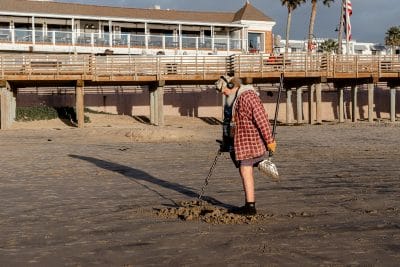
It is important that you know the right technique for sweeping. Many people simply assume that if they move the metal detector randomly over a location, it will detect treasure if there’s anything present. This is not correct…
There are many techniques involved in making your metal detecting trip a successful one. The most commonly used techniques include:
- Overlapping Pattern: This is one of the most common patterns used in any metal detecting. The main advantage of using this pattern is that with each pass, you are overlapping on the previous pass. This ensures that there is no undetected part of the location left, and you are less likely to miss out on a target. However, this pattern can be very time-consuming, and it makes take you a long time to cover one particular spot.
- Spiral Pattern: A spiral pattern is used when you have already detected one target and recovered it from the ground. The purpose of doing a spiral pattern search around the place where you found the target is to search for any additional finds that the same person may have lost at the same time. A drawback of a spiral pattern is that you may miss certain areas in between the spirals.
- Random Pattern: Detecting using a random search pattern is a very common pattern used by beginners. However, the drawback is that many areas of the location will be left undetected, and there is no certainty that you will end up finding something of value in the place you have picked for the random search.
Learn how to get Permit/Permission for your Hunts
If you are new to metal detecting or if you are planning to metal detect in a new country or state or even a new city, then it is of utmost importance that you learn the laws surrounding the hobby in the new place.
Before you begin digging anywhere, you need to be sure that you won’t be breaking any laws. While metal detecting is a wonderful hobby for many reasons, not following the law could very well get you into trouble.
If you have not gotten the required permit for digging at your selected site, then you could be looking at a hefty fine, a felony offense, or even land up in jail.
Furthermore, you also cannot plead ignorance as if you are smart enough to be metal detecting, you are definitely smart enough to learn about the laws of metal detecting.
Find out as much as you can about metal detecting laws and always get the requisite permits when and where required before you start hunting and digging.
Learn & respect the hobby code of ethics
There is a certain code of ethics all metal detectorists follow. This is an unwritten rule that keeps the hobby alive.
The biggest thing to watch for is to ensure that you do not disturb the regular people at any location with your detecting. If you are metal detecting in a public place, then your priority should be that regular people do not get disturbed. Keep in mind that everyone values their privacy, regardless of whether they are present at a public place. So make sure that you maintain a proper distance from the crowd present, do not have your metal detector beeping all the time (instead choose to use a headphone so that no one gets disturbed by the noise), and preferably choose to metal detect at a time when there are not a lot of people around. This is especially true for metal detecting at the beach.
At the same time, if you are metal detecting a public place, such as a beach, then chances are high that there will be other metal detectorists in the vicinity also detecting with their metal detector. While you may get excited to see someone else having the same hobby as yours, the ethical thing to do here will be to not interfere with them. Let them carry on with their detecting and you carry on with yours.
While metal detecting, it is important for you to keep in mind that if you knowingly keep something that does not belong to you, it could be deemed as an offense in many parts of the world. However, if you do not know who it belongs to, then one can still understand keeping the item. But, if you are aware of the person who the item that you have found belongs to, then you must make the effort to go and return it to the rightful owner. This is especially true if you are detecting on that person’s private property itself.
The code of ethics also applies to finding any archaeologically important find. It has happened many times that a detectorist has chanced upon an archaeological relic or artifact that is not just valuable but also holds great historical value. In such cases, instead of keeping the find to yourself, the correct thing to do would be to inform the local authorities and hand over the item to the correct department or authorities. Keep in mind that a harmless leisure pursuit should not cause any archaeological discontent within your city/country.
You do not want archaeologists to become upset over the fact that metal detectorists are taking away important archaeological finds from the region. Furthermore, this creates a bad name for all metal detectorists. Take care of the find and hand it over to the correct authorities in a timely manner.
At the end of your detecting session, do not leave holes and take away the trash.
Identify your finds properly
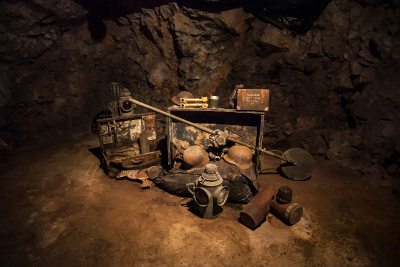
Finding metal objects is now a common occurrence. However, you must know how to identify the finds first. In most situations, it is possible to identify the discovery and metal from which the object is made by looking at the type of corrosion present on the surface. Here are some tips on how to correctly identify your metal detecting finds.
- Gold: Gold is one such metal that retains its shine forever and does not corrode. However, remember that not all shiny yellow metal objects will be gold. Objects made from copper alloys also appear similar to gold, especially when they are new.
- Silver: Silver corrodes very quickly. Any object made from silver that has oxidized badly will be covered in a type of black patina. It is difficult to identify the object being made from silver without washing it properly first.
- Iron: It is easy to identify iron objects due to the rusting. Sometimes, though, iron oxide coating can cause two or more things to join together, appearing to be one object. If you suspect such a scenario, the only way to identify the find will be by taking an X-ray to see what lies beneath the corrosion.
- Copper: Copper corrosion is usually powdery and green in color.
- Lead: Lead forms a white crust on the surface. A lead object is also much heavier than what you might expect when you pick it up.
Preserve your finds
When you are out metal detecting, you will inevitably find something valuable some time or the other. It might be an old coin or even an ancient relic that might hold historical importance. When you find something valuable, it is essential to take care of the item and preserve it properly. There are many tools and techniques that are used to thoroughly clean and protect different types of metal detector finds.
The first step is to clean the item. Some commonly found metals while metal detecting includes iron, copper, bronze, brass, silver, gold, and aluminum. You may even find some items made from pewter. Some items may even be plated. You need to take extra care while cleaning any plated objects as these tend to get ruined easily. Relic items like old watches may be made up of several different metals, due to which you need to be careful while cleaning these as well.
Remember to be gentle when digging up your find because scratches get made on valuable treasures with your digging tools. You also have to be gentle while rubbing off the dirt from your object, as this may also lead to scratches.
For relics made of iron, it is important to know that rust will corrode iron objects. This is why to preserve iron objects, you must protect them immediately after they are dug up. Keep them safe from moisture and oxygen.
If your recovered iron relic is valuable, you should consider having a professional clean and preserve the item.
For copper and brass finds, a simple oxidation treatment with a homemade mixture will help clean the object.
Coins made of silver and gold usually need little preservation since these elements are stable from any environmental deterioration. However, it is vital to avoid any physical damage to these finds.
Old relics like lead bullets and figurines also need little cleaning and preservation.
The most important thing to remember while preserving your finds is to think about your preservation plan beforehand.
Make the hobby profitable
There are many options on how to sell your finds from metal detecting and make a profit. Here is a list of options on how to sell your finds, but some may or may not apply to you, depending on where you reside.
Specific shops: Certain shops in many countries mention that they buy gold and silver from walk-in customers. So if you have a valuable find made from either of these metals, you can try to sell your object at such a shop. However, while you will find that these shops are quick to buy your gold/silver object, they are unlikely to give you an excellent price.
Jeweler: Many jewelers give a good compensation for gold/silver objects, especially jewelry finds. It is a good idea to try your luck at various jewelry stores to get the best offer.
Online marketplaces like e-Bay or Amazon: You will find that people sell all sorts of things online, including finds from metal detecting. You can sell finds like coins, relics, and even antique glass bottles online. Remember that trading on online portals means you will have to include courier charges since you will need to send the item to the buyer.
Final Thoughts …
Metal detecting can be a lonely hobby as you are out alone for many hours sweeping and searching through different places and hoping to find treasure.
It doesn’t need to be a lonely hobby if you join a club. With the growing popularity of metal detecting, there are many metal detecting clubs that have sprung up all across the US and even in different countries.
Being a part of a metal detecting club can help you learn more about your local history, new places to detect, and you can even participate in group hunts.
